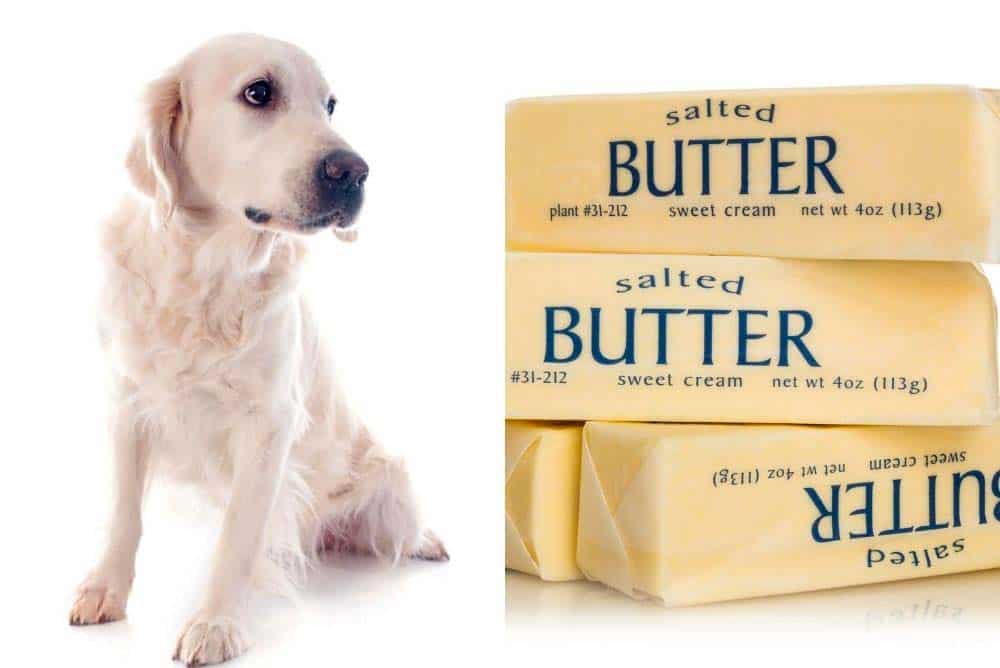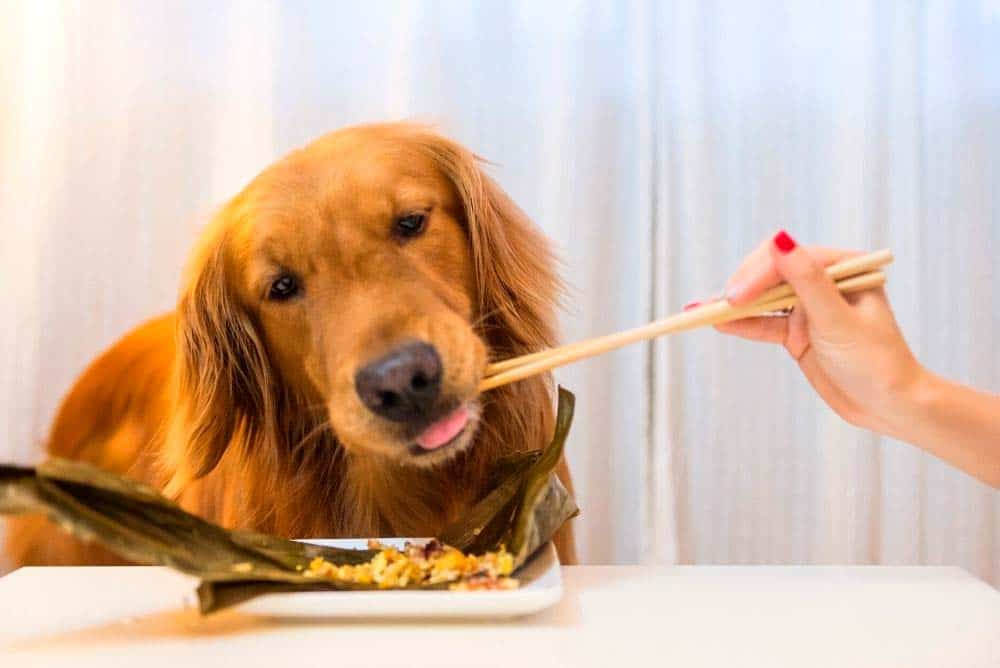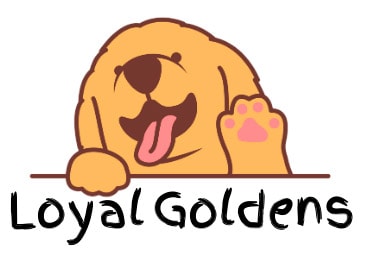Animals can be pretty sneaky, especially dogs. If you aren’t careful, they’ll sneak in and snag that stick of butter right off your kitchen counter. So, what do you do if your golden retriever eats a stick of butter?
If your Golden Retriever ate a stick of butter, it is not likely to cause long term problems for him. He is likely, however, to have a bout of diarrhea. Regular ingestion of dairy products has been known to cause gastroenteritis and pancreatitis in dogs, and dairy consumed in excess can lead to other issues down the road.
Let’s take a deeper look at what happens if your Golden Retriever eats a stick of butter and what you can do.

(This article may contain affiliate links and loyalgoldens may earn a commission if a purchase is made.)
Unlock your goldens natural intelligence and see just how quickly problem behaviors disappear.This is the best at home dog training I've ever used!
Time to Call the Vet
If your dog has eaten a stick of butter, it’s a good idea to call your vet right away even if it’s unlikely to cause your golden a big problem. They’ll be able to assess the situation and offer you the best solution for your Golden Retriever.
You must call your vet immediately if your dog exhibits any vomiting, diarrhea, loss of appetite, or tender abdomen. These could be the early warning signs of something much more serious.
Why Can’t Dogs Have Butter?
Butter is a dairy product, and dairy is not easy for dogs to process. Most dogs are lactose intolerant, which means they aren’t capable of processing dairy as most humans are.
Signs of Lactose Intolerance in Dogs
When a dog has an intolerance to dairy (not all dogs will), there are a few adverse reactions you can look out for after your dog consumes it:
- Diarrhea
- Bloating
- Stomach discomfort
In addition to the dairy, butter is also saturated fat. Like humans, dogs have a certain fat intake limit to maintain a healthy diet. However, their limit is much smaller than humans. An adult dog around 30lbs will only need to ingest 14g of fat every day. Anything more than that is too much and could cause health problems for the dog.
An entire stick of real butter, not the oil-based kind, is roughly 92g of fat. That is a lot of fat for a dog to eat, especially with their normal limit. This level of fat content on a semi-regular basis could cause severe problems later, such as pancreatitis.
Accidents do happen, and every once in a while these kinds of foods aren’t going to harm your dog. However, it’s the long term consumption that you have to watch out for.
Common Side Effects
So, what happens when a dog eats a stick of butter? Well, it depends on the dog. Sometimes nothing will happen, but other times you’ll need to keep an eye out for a few side effects.
Some of the common things that you’ll notice in the short term can be excessive gas, stomach pain, diarrhea, or constipation. The degree of how these will affect your dog will vary, but these are typical things to watch out for.
Gastroenteritis
Gastroenteritis in dogs can be pretty serious, depending on how your dog gets it. Gastroenteritis is caused by various things, and can also cause a variety of issues in your dog. Two of those problems can be a food allergy, or if your dog eats a foreign non-food object, like the wrapper around a stick of butter.
So, what exactly is gastroenteritis, and why is it so serious? Well, there are actually two types, namely, acute and chronic. It can also present itself in different ways, such as only vomiting or only diarrhea.

Acute gastroenteritis will typically occur right away or within a few days. It’s also usually gone as quickly as it started. Typically, acute gastroenteritis will go away on its own without the need of a vet. However, it’s important to keep an eye on it in case it worsens. On the other hand, chronic gastroenteritis is slower, sometimes lasting for weeks or even months.
If you suspect your dog has eaten a stick of butter, and you’re worried about gastroenteritis, keep an eye out for the symptoms listed below:
- Explosive diarrhea
- Tarry droppings
- Watery stool
- Blood in their droppings
- Restlessness
- Abdominal pain
- Lethargy
- Vomiting
- Nausea and excessive drooling
If your dog has any of these symptoms, it’s best to check in with your vet to be safe.
Pancreatitis
Another risk your dog has is pancreatitis. This can be a serious and sometimes fatal disease for your dog. Some of the symptoms involved can be mistaken as being less serious, which makes this disease all the more dangerous.
The pancreas releases important enzymes that help food digestion. With a normal working pancreas, those enzymes will only activate when they reach the small intestine. However, when a dog has pancreatitis, those same enzymes will activate before they reach the small intestine. This causes inflammation and pain to the pancreas as well as the surrounding tissues and organs.
The biggest cause of this disease is a high fatty diet. Large amounts of high-fat foods can lead to pancreatitis. This is especially true in dogs that don’t have an active lifestyle. It’s extra important to keep an eye on your dog’s diet around the holidays when it’s easy for fatty foods from the table to end up in the dog’s mouth.
This kind of disease isn’t something you can take care of on your own. You’ll want to contact your vet immediately if your dog frequently experiences two or more of the following symptoms.
- Hunched Back
- Vomiting
- Bloating
- Painful abdomen
- Diarrhea
- Fever
- Weakness
- Dehydration
- Loss of appetite
If your dog experiences more than one of these symptoms frequently, you must call your vet right away.
Other Table Foods to Keep from Your Golden Retriever
In addition to butter, there are a lot of human foods that are dangerous for dogs. Many of these aren’t commonly known and might surprise you. Take a look below at some other things your dog should avoid.
Cheese
Just like butter, cheese is a dairy product that could be difficult for your dog to digest. Cheese is often a popular choice of table food to give your dogs, but because of the lactose intolerance in many dogs, this food can cause stomach problems such as diarrhea.
Raw Meat and Eggs
Salmonella and E. Coli aren’t limited to humans. Dogs can get them too, which means that raw eggs and raw meat should be avoided until they are completely cooked.
Peanut Butter
This is probably one of the most popular treats for dogs but should be given in small amounts. Like humans, dogs can have a peanut allergy. In addition to a possible allergy, peanut butter is another food that’s high in fat.
Certain Fruits
There are certain kinds of fruits that are okay for dogs, but not all fruits are. Grapes, avocados, and citrus fruits are toxic to dogs. There’s a range of symptoms starting with an upset stomach and ending in death.
It’s important to remember that foods that are high in sugar should be limited in your dog’s diet, but can be a tasty snack occasionally. Apples (without any seeds), bananas, and blueberries are examples of fruits your dog can enjoy.
Caffeine
There is a wide variety of foods that contain caffeine. This is where the problem with chocolate comes into play. These foods have higher levels of caffeine and contain methylxanthines, which, if consumed in high quantities, can cause severe health problems.
Certain Vegetables
Just like with fruit, some veggies aren’t good for your dog either. Onions, garlic, and mushrooms aren’t safe for them, as well as chives and rhubarb leaves. As with fruits, there are some safe options, like cucumbers and carrots. Carrots are even great to clean your dog’s teeth! Just remember to feed them sparingly.
Discover how to train your Golden Retriever by playing games: 21 games to play with your Golden that will make them smarter and better behaved!
Conclusion
While eating a stick of butter may not hurt your dog in the short-term, it could do some damage in the long-term if it becomes a regular addition to their diet. If your Golden Retriever eats a stick of butter, the best thing you can do is call your vet and monitor their symptoms.
More Golden Retriever Articles You’ll Love!
- Is Bravecto Safe for Golden Retrievers? (Explained!)
- Golden Retriever Snoring (Normal or Not?)
- Is the FURminator Safe for Golden Retrievers? (The Facts!)
- Does Your Golden Retriever Drool a Lot? (Should You Worry?)
Sources
- VCA Hospitals: Food Intolerance in Dogs
- Hills Pet: Gastroenteritis in Dogs: What You Need to Know
- AKC: Pancreatitis in Dogs – Symptoms, Causes & Treatment
- Whole Dog Journal: Canine Pancreatitis
- Pet Poison Helpline: Is Table Food Poisonous For Dogs?
- Pets – WebMD: Pancreatitis in Dogs: Symptoms and Treatments
- Lazy Paws Vet: Fatty Foods and Pancreatitis
